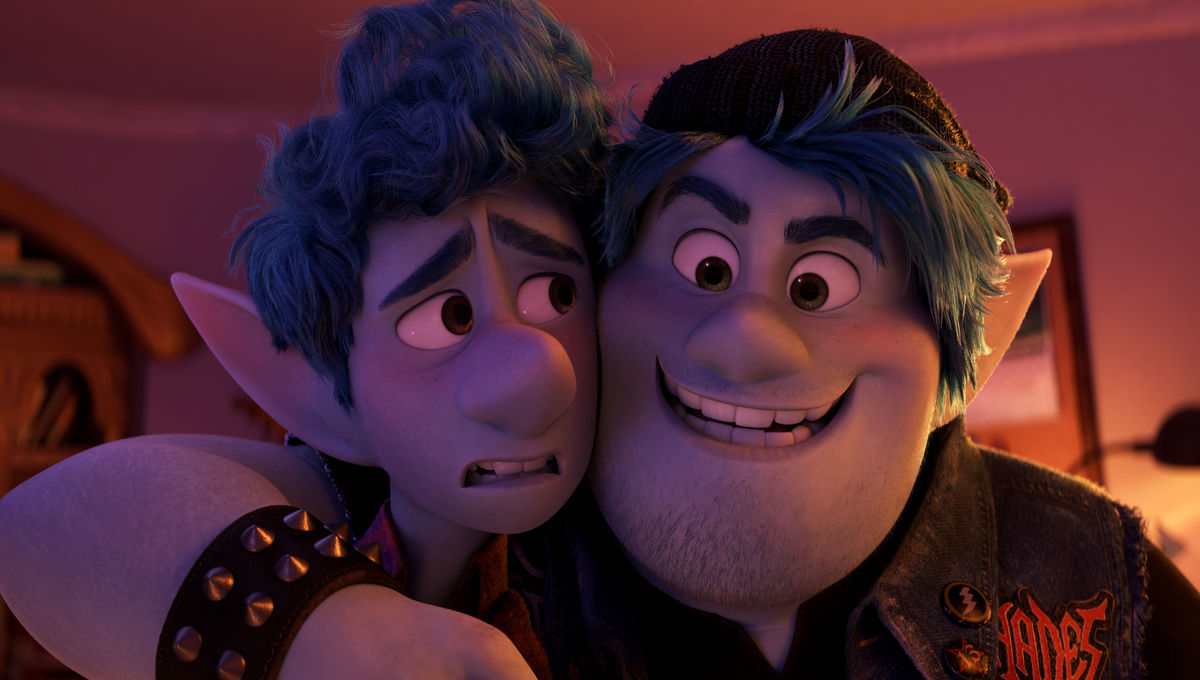The Old Familiar Magic, by Reed Lackey
3 Mar

After more than two decades of storytelling, Pixar’s formula is fairly well set in stone. Each of their films introduces a unique world and its characters, after which shortly follows a problem – or a need – which initiates a quest into an uncertain and uncharted landscape. Eventually revelations occur, most frequently of the relational variety, where our characters experience epiphanies about themselves and those closest to them before likely returning home with a renewed understanding or a refreshed sense of purpose.
There have been precious few exceptions to this recipe (Toy Story 4 gave us a rather bold ending and Ratatouille nearly breaks the mold entirely) but when an emotionally resonant structure works as well as it has for Pixar, there’s very little sense in trying too hard to change it. That brings us to their latest entry: Onward, directed by Dan Scanlon, who had previously helmed Monsters University. Onward is a film which mostly works in all the ways Pixar films usually do, which pits its ultimate impact against some heavy competition in their more inventive stories, but also nearly guarantees that you’ll find it resonant, emotional, and well worth your time.
The world this time is pure fantasy, of the stereotypical sword-and-sorcery variety. In a time when the usage and mastering of magic has largely been forgotten, young Ian Lightfoot (voiced by Tom Holland) is trying to make it through his sixteenth birthday without making a fool of himself, being embarrassed by his older brother Barley (Chris Pratt), or dwelling too much on the loss of his father, who had passed away when Ian was still far too young to have any memories of him. But when his mother reveals that his father had left him a gift to be saved especially for this occasion, he is in awe to discover that a magical spell will bring his father back for one day only. When the spell goes awry midway through, leaving literally only their father’s legs from the waist down, Ian and Barley set out on a search for another magical phoenix gem to complete the spell (and their father’s torso) before the day is over and they lose the chance to see their father again forever.
Onward’s first major hurdle is establishing the setting, the characters, and the rules of the magical elements inherent to the narrative efficiently without feeling too mechanical. It stumbles a bit in this effort, gifting characters with conveniently astute knowledge a bit too easily and so briskly ushering us into the first couple of steps of the central quest that it risks crumbling under the weight of its own plot. Thankfully, this imbalance quickly evens out past the first third of the film once the two brothers have progressed far enough into their quest for the story to breathe and develop them each as characters, better establishing the dynamic of their relationship. Telling a story which revolves primarily around brothers who grew up fatherless is a tall order to portray for younger audiences in a way that neither feels too trite or too heavy-handed, and it is impressive that the film manages to strike that balance in an effective and resonant way.
The usual collection of laughs helps achieve this balance. The story makes clever use of its fantasy-meets-modern-world trappings to provide some genuinely funny setups (the best of which involves a biker gang entirely made up of tiny fairies). Julia Louis-Dreyfus and Octavia Spencer respectively voice the boys’ mother and an entrepreneurial Manticore who are pursuing the brothers with the intent to assist and possibly rescue them. Despite the mother’s relational relevance to the central quest (the boys are seeking to revive her husband after all), the pair of them provide mostly comic relief, with the exception of the film’s climactic resolution, where its unique thematic pursuit comes to full fruition. As has come to be expected with Pixar films, there’s a high likelihood of at least a few misty eyes if not some outright tears once everything unfolds.
But while the film could reasonably be taken to task for relying a bit too heavily on the Pixar cinematic recipe, the familiarity of the style and tone in no way dilute the underlying theme of the film, which has some pretty powerful statements to make about letting go of what you’ve lost in order to embrace who you are. Loss hangs over the entire established world, beginning crucially with the information that once, some time ago, there was magic. And as this quest for one more day with a long-lost patriarch moves forward, the recurring motif of loss stands out in both overt and subtle ways. Characters like those aforementioned fairies and the Manticore have to come to terms with the ways they’ve lost their sense of self in a swell of modernization. And by the end of the film, loss becomes something that our characters begin to openly embrace so that their quest can succeed or so that their loved one’s needs will be prioritized over their own. It’s certainly not the first time a Pixar story has dealt with loss, but it may be one of their most mature and sensitive statements about it yet.
Onward may not be able to stand quite tall enough beside some of Pixar’s more landmark entries, but it is effortlessly populated with all of the laughter and warmth that has come to make the studio’s efforts so engaging, while also displaying the kind of mature observations about our emotional landscape that can prove both cathartic and inspiring. If you’ll forgive the painfully obvious metaphor, it’s a quest well worth taking.



No comments yet